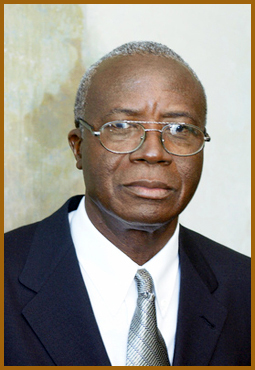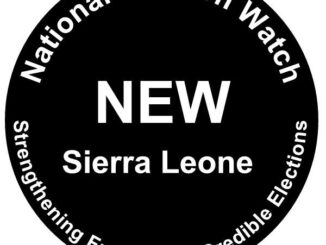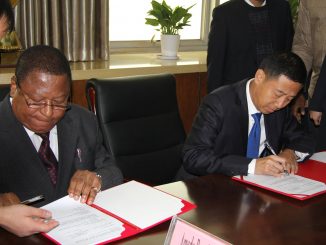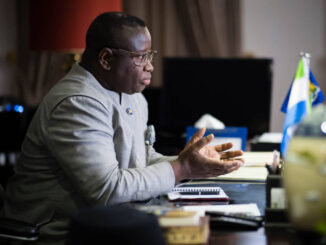
By Professor Joe Pemagbi
The wave of institutionalization of democracy through regular elections in Sub-Saharan Africa has intensified over the last two decades.[1] Despite its accompanying challenges, they still give citizens an opportunity to participate in their governance. Whether this is an indication of democratic growth in fledgling democracies like Liberia and Sierra Leone is still up for debate as both countries head to the polls. Liberians will vote in the second round of the Presidential elections in the coming weeks[2] while, Sierra Leoneans go to the multi-tier elections (Presidential, Parliamentary and Local Government elections) on March 7th, 2018. Despite their differences, both countries have quite a bit in common, such as similarities in food, sources of income and the unenviable notoriety for bad governance. Each country also has the potential to inspire the other to higher heights in transforming the lives of their citizens. These epoch-making elections in Liberia and Sierra Leone will see the end of constitutional term limits of both Presidents Ellen Johnson-Sirleaf and Ernest Koroma. The elections could be a vital test and evidence of their democratic growth through smooth democratic transitions that citizens hope will put decades of corruption and politics of patronage behind them.
The legacies of leadership and its implications
The despotic style of leadership perpetrated through slavery by the slave masters in the Liberian context and colonial masters in Sierra Leone are unpalatable legacies that permeate our governance systems through politics of intimidation, patronage and clientelism. This seem to have informed the style of governance for decades despite the emergence of modern day democracy through military coup d’états or citizens’ movements.
Ethno-regional Quagmire and Its Impact on Elections
Even though Liberia was not colonized, the Americo-Liberians or Congos maintain elite status that is seemingly associated with the United States and the rest of the west. The same might not be said about their counterparts, the Krios in Sierra Leone, whose academic prowess and political authority in Sierra Leone has not necessarily led to their ascendance to and retention of political power. Interestingly, the first round results of Liberia’s October 10th, 2017 elections may have rekindled the unspoken tension between the Congos and the ‘natives’ coupled with the newly formed ‘divisions’ among the native population. None of the Americo-Liberian candidates[3] will make it to the run-off, instead, Vice President Boakai of the ruling Unity Party and George Weah of the CDC party, whose party won in thirteen of Liberia’s fifteen electoral districts are the two most likely candidates to vie for the Presidency. [4] In addition, the high number of presidential candidates made it impossible for any one candidate to cross the required threshold of 50%+1 to be declared winner. Even though the CDC won 13 of the 15 counties, not being able to attain the 50%+1 threshold denied them an outright victory. While the on-going horse trading continues in Liberia, the unspoken ethnic versus patronage and ethno-regional politics are variables that could inform the decisions of the ‘smaller’ political parties[5]. Across the river in Sierra Leone, the emergence of the National Grand Coalition (NGC) and the possibility of more coalition parties, though not a novelty, could impact Sierra Leone’s political landscape[6]. The major political parties – the All Peoples Congress (APC) and the Sierra Leone Peoples Party (SLPP) might need to seriously reflect on and consider their campaign strategies on a national scale and how they intend to deliver on the bread and butter issues that affect the daily lives of citizens across the country since hardship and bad governance affect all citizens in Sierra Leone.
Like most African democracies, Sierra Leone and Liberia have seen a proliferation of registered political parties[7]. In Sierra Leone, political parties were formed in the pre-independence era while roughly 95% of Liberian political parties were formed in the post-conflict era[8]. The justifications for this are numerous and perplexing, for example the older parties in Sierra Leone are often accustomed to questionable systems of governance that do not necessarily promote the participation of their members, especially in decision-making processes, thereby creating the undue ‘fatigue’ and frustration of their existence. In Liberia, the call for generational change in the political landscape is fast becoming a reality. The youthful Coalition for Democratic Change (CDC) headed by soccer star George Weah seems to be winning the hearts and minds of the youth and middle aged who are frustrated by years of poor performance by the older established ruling Unity Party (UP).
In other circumstances, leaders of the new and “smaller” parties claim to be “called upon by the people to redeem them”, while others establish proxy and transient parties to enhance their political standing and capital despite the glaring signs that their efforts are sometimes futile and deemed a waste of personal and state resources.
The Youth Factor
Young Liberians have been demonstrating commendable exuberance and engagement in this electoral cycle by helping to mobilize votes and taking part in civic education initiatives. This is driven by their desire to canvas votes and see their political parties win. Even though Political Party campaigns are competitive, they are non-violent. They are largely seen as outcomes of national consciousness emanating from lessons learned from the decade long Liberian civil war and the relative progress and achievements with democratic stability. Civil Society actors and the international community have been quite instrumental in promoting peaceful elections and citizen engagement through coordinated peace caravans, town hall meetings, and peaceful messages like “Vote Not Fight” and “Election is Everyone’s Business’ Among Others”. They have taken advantage of the youth bulge and their willpower to engage and interrogate the “democratic dividend”[9].
Across the border in Sierra Leone, the echoes must be heard about the potential of youth engagement and the need for the constructive involvement in the democratization processes. We would need to find new ways of mobilizing youth to discuss issues instead of sentiments. Additionally, harnessing their potential would be key instead of hosting and participating in paid up raucous political party carnivals in the form of party rallies.
Media Pluralism or Ambivalence?
The media landscape, especially in the post-conflict era, can best be described as pluralistic. Both countries have experienced a massive proliferation of media institutions seeking to use the accessibility of information to encourage the participation of citizens in democratic processes. The enactment of the Access to Information (ATI) Law is an attempt, by both the Liberian and Sierra Leonean Governments, to empower citizens to participate in governance, which is a fundamental factor in the development of every democracy. There is however a gaping lacunae between what is enacted and the reality on the ground. Despite the establishment of National Information Commissions and CSO information coalitions, they are plagued with serious implementation gaps pointing to the lack of political will, irregular and inadequate funding and the lack of institutional capacity to operate independently. However, in the months leading up to Election Day and the day after, Liberian media institutions ensured a peaceful and informed election process. An example worth emulating by media institutions in the lead up to the 2018 elections in Sierra Leone.
The role of state broadcasters in both countries has garnered both attention and criticism because of the propensity for the incumbent government to take advantage of what is supposed to be public property. There have been complaints of bias coverage by both opposition parties, the SLPP and CDC in Sierra Leone and Liberia respectively. The media is also replete with arguments that ruling parties in both countries have the resources and can strategically engage their supporters to generate required funds for their party machinery to propagate their policies. However, one need not second guess that the “winner takes all” mentality and subtle authoritarian governance style compels leaders and personnel of Ministries, Departments and Agencies (MDAs) to turn a blind eye to policies that are passively implemented. As Liberians prepare for the run-off between Vice President Joseph Boakai and the opposition candidate George Weah, Liberians and the international community would continue to closely monitor the role of several media institutions in promoting peaceful and credible elections in the coming weeks. In the midst of all the aspersions and allegiance debates, the ownership and regulatory mechanisms of the Press Union of Liberia (PUL) and the Sierra Leone Association of Journalists (SLAJ) remain under the spotlight because they impact the quality of reports disseminated to the public.
The Governance Deficit of the Political Parties
Governance systems within political parties in Sub-Saharan Africa can exacerbate different challenges faced at the national level because the trend of thought is that the culture of abusing power, patronage and clientelism, even at the political level, is passed on at the national governance level. Ideally, parties are expected to have governance structures with clear processes and systems that determine confidentiality at all levels, means of attending to power as well at checks and balances with laid down grievances addressing structures. In both countries, there are clear indications that parties lack clear political ideology and effective governance systems in political parties that have led to constant membership defection to other parties they consider more open, democratic and/or sympathetic to their aspirations.
The Judiciary: A friend or foe?
The Judiciary plays a key role in ensuring that the democratic rights of citizens are respected by guaranteeing the respect for the rule of law. It is their responsibility to ensure that actors, including political parties follow the rules outlined in electoral laws and the countries’ constitution. More often than not, the courts in Liberia and Sierra Leone have been called upon to interpret and adjudicate matters before them to ensure that the integrity of the electoral process is assured. The decision made by the Liberian Supreme Court with regards to the election petition case filed by Charles Brumskine is the most recent example that brings the role of the courts to the fore, particularly on the need for their independence as well as the integrity of the Elections Management Body[10]. Similarly, on several occasions, the courts have been called to action in Sierra Leone to adjudicate electoral matters[11]. The conduct of the judiciary in electoral processes remains integral and must therefore be seen as independent from the influence of the Executive office.
Conclusion
In conclusion, the echoes from across the river sound out the ominous warning of change at all costs and for what is considered the ‘rejected or lost generation’. What is left to be seen is if the echoes take a turn for the best as we await the elections results in Liberia and Sierra Leone in 2018. These elections remain crucial for the deepening of democratic values and the promotion of sustainable development as evidence of the badly needed democratic dividend.
Editor’s Note: Professor Joe Pemagbi is the Sierra Leone Country Officer at OSIWA (@pemagbi1)




